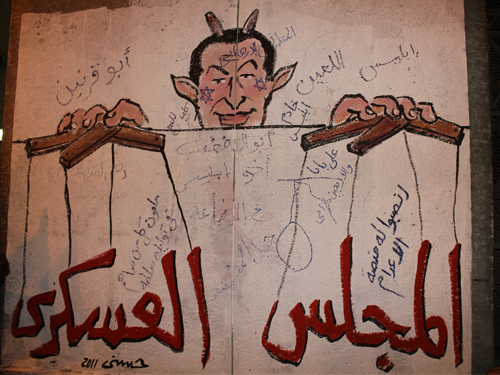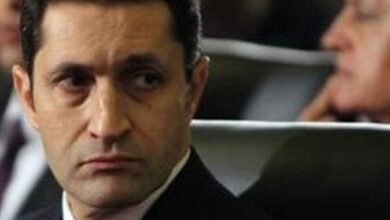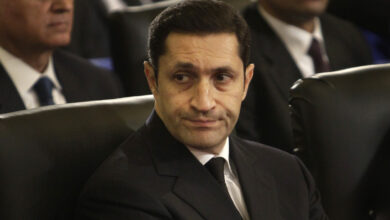
Thursday's papers highlight the second day of arguments by former President Hosni Mubarak's defense lawyers in his trial on charges of corruption and killing protesters. All papers except state-owned Al-Ahram lead with arguments made Wednesday by attorney Farid al-Deeb, who said the military was in charge when protesters died on the 28 of January during the uprising.
Privately owned Al-Shorouk reports that Deeb has "sacrificed the Supreme Council of the Armed Forces (SCAF) to save Mubarak." He argued that when former Interior Minister Habib al-Adly told the president that his ministry was unable to handle the protests on 28 January, Mubarak — in his position as supreme leader of the armed forces — used his constitutional powers to impose a curfew and at 4 pm, assigned the armed forces the responsibility to restore order and security. Deeb claimed most deaths occurred after 4 pm that day.
Privately owned Al-Tahrir quotes prosecuting lawyer Sameh Ashour as saying that even if Deeb's arguments are accepted by the court, they do not negate the charges against Mubarak as he was still the leader of the armed forces up until his resignation on 11 February.
Privately owned Youm7 reports that Deeb "reversed his prior accusations [against] the armed forces" by saying that the army did not shoot protesters, and by citing laws justifying shooting "rioters" if the military has not granted permission to protest and if the military deems it is under attack.
"The military has insisted that it has not used force or live ammunition against the protesters, and the army does not lie," Deeb reportedly said.
State-run Al-Akhbar leads with Deeb's statement that any rallying after the army had been deployed was "rioting" and thus open to legal punishment.
Not surprisingly, Al-Ahram takes a different approach on its front page, choosing not to highlight Deeb's accusation of the military. Instead its headlines read, "Mubarak's defense accuses 'infiltrators' of killing protesters'" and "It is the military leader's right to shoot at mobs after warning them."
Youm7 and Al-Ahram quote Deeb blaming protester deaths on alleged "foreigners and armed criminals who infiltrated the protests, stormed prisons and stole arms."
Following Deeb's presentation, the Cairo Criminal Court, headed by Judge Ahmed Refaat, adjourned the trial of Mubarak, his sons Alaa and Gamal, Adly and six security officials until Thursday.
Thursday's papers also focus on US Ambassador to Egypt Anne Patterson's visit to the Muslim Brotherhood's headquarters in Cairo. Al-Tahrir summarizes Brotherhood Supreme Guide Mohamed Badie's statements during the meeting: "We trust our parliament and our army; we reject any force above the constitution and the people; American aid should be known to the government and unconditional." Al-Dostour runs a headline quoting Patterson's declaration in her unprecedented visit: "We were wrong," she reportedly said, referring to previous US support for Mubarak. "Democracy always brings stable partners."
Badie told Patterson that "Sharia (Islamic law) is the main source of legislation, as it grants freedom of belief and personal rights to all citizens equally," Al-Dostour reports. Patterson is quoted in most papers as saying that Egypt, mired in an economic crisis, needs a loan from the World Bank. Badie responded that the matter will be subject to parliamentary debate.
Papers also report on the Supreme Constitutional Court's rejection of the presidential election draft law. Al-Tahrir begins its report by saying that the history of the court is filled with instances in which it sided with the people and higher constitutional values. The report then elaborates on the court's decision that four articles in the draft law are incompatible with the March 2011 Constitutional Declaration. Al-Shorouk reports that the high court has enjoined the SCAF to amend the articles in question.
Al-Dostour and party-run Al-Wafd newspaper report on Wafd Party head Al-Sayed al-Badawy's resignation from the SCAF-appointed advisory council, which was formed in December to "assist" the government in decision-making. Badawy justified his move by citing his desire to spend more time and effort in his duty as a newly elected member of parliament, arguing that "legislative solutions" are the only way out of Egypt's instability.
Al-Wafd runs a special file titled, "Be angry, go out and revolt; people march to topple the Field Marshal [Hussein Tantawi], and the SCAF moves to abort the revolution." The file begins with a piece by Tareq al-Mahdawy, "Blood, the weapon the leaders of the 11 February coup use to stay in power," in which he argues that amending Article 76 of the constitution in May 2005 and March 2007 blocked high-ranking military officials from running for president by requiring candidates to belong to a political party for a minimum amount of time. Since this amendment, the military has been planning to overthrow the president to reverse the amendment and topple its supports both in power and the opposition, Mahdawy argues.
He goes on to say that those in the army planning the coup began to put their plan into action on 11 February, pretending they were "protecting the people from invisible hands." Mahdawy says that Egypt is at a crossroads, and has the choice to either allow the military to continue in power — either directly or behind a civilian façade — or choose the revolutionary path.
Egypt's papers:
Al-Ahram: Daily, state-run, largest distribution in Egypt
Al-Akhbar: Daily, state-run, second to Al-Ahram in institutional size
Al-Gomhurriya: Daily, state-run
Rose al-Youssef: Daily, state-run
Al-Dostour: Daily, privately owned
Al-Shorouk: Daily, privately owned
Al-Wafd: Daily, published by the liberal Wafd Party
Youm7: Daily, privately owned
Al-Tahrir: Daily, privately owned
Freedom and Justice: Daily, published by the Muslim Brotherhood's Freedom and Justice Party
Sawt al-Umma: Weekly, privately owned
Al-Arabi: Weekly, published by the Nasserist Party
Al-Nour: Official paper of the Salafi Nour Party




